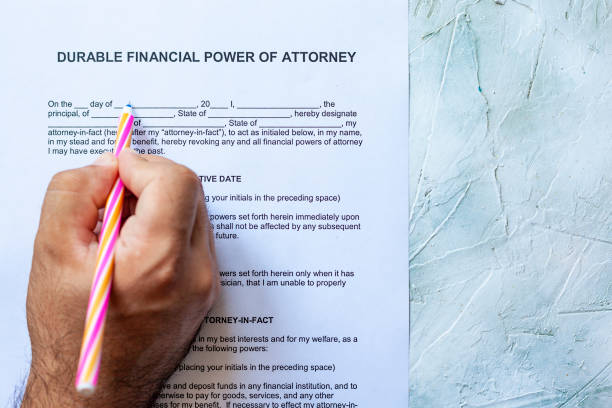Understanding the Role and Importance of a Financial Power of Attorney
What is a Financial Power of Attorney?
Introduction
In today’s complicated financial landscape, it is vital to be ready for unexpected situations. One way to make sure your money matters are handled properly if you can’t do it yourself is by setting up a financial power of attorney. This blog will guide you through details about this legal document, including what’s important, the advantages it offers, and what you need to think about when setting up.
Table of Contents
1. Understanding Power of Attorney
2. The Role of a Financial Power of Attorney
3. Types of Power of Attorney
4. Creating a Financial Power of Attorney
5. The Importance of Choosing the Right Agent
6. Key Considerations
Understanding Power of Attorney
Power of attorney is a legal paper that gives someone else the power to act on their behalf in legal and financial matters. This person is called an “agent” or “attorney-in-fact” and makes decisions for the other person called the “principal”.
Power of attorney is important for people who might become unable to handle their own affairs because of sickness, injury or unexpected situations. By choosing someone to handle their matters, people can make sure their money and other financial matters are taken care of properly.
The Role of a Financial Power of Attorney
A financial power of attorney is a legal document that focuses on money matters and gives someone authority to make financial decisions and take actions on behalf of another person. This includes tasks like managing bank accounts, paying bills, doing taxes, dealing with investments, and handling real estate transactions. When people sign a financial power of attorney they can choose someone they trust to manage their finances.
Types of Power of Attorney
There are different types of power of attorney, each with its own scope and limitations. Let’s explore the most common types:
General Power of Attorney

A general power of attorney grants broad powers to the agent, allowing them to act on behalf of the principal in almost all financial and legal matters. It is important to note that a general power of attorney becomes void if the principal becomes incapacitated.
Limited Power of Attorney
Unlike a general power of attorney, a limited power of attorney restricts the agent’s powers to specific actions or a particular period. This type of power of attorney is commonly used for short-term or specific transactions, such as selling a property or managing a business in the principal’s absence.
Durable Power of Attorney

A durable power of attorney remains in effect even if the principal becomes incapacitated. It is an important distinction because it ensures that the agent’s authority to act on the principal’s behalf continues uninterrupted even if the principal’s capacity is compromised.
Creating a Financial Power of Attorney
The process of creating a financial power of attorney typically involves the following steps:
1. Consultation:
Talk to a lawyer who knows to plan on what will happen to your things when there is an unexpected situation, who can help make your decisions when you can’t. They can help you understand what you need to do legally, and do it correctly to make sure you are taken care of.
2. Agent Selection:
Always choose the right person for the right job. Check how good they are with money matters, how reliable they are, and if they are able to take on duties that come with the role. It is really important to choose someone who will always look out for our best interests.
3. Document Drafting:
Work with a lawyer and create a document called the ‘financial power of attorney’. This document should explain clearly what the person you choose can and cannot do, and follows the laws in your area.
4. Execution and Notarization:
To make sure that the financial power of attorney is legally binding, sign it before a notary public or other approved witnesses, as needed by the laws in your area. This way the document is official and can be enforced when needed.
5. Distribution and Record-Keeping:
Give your agent, bank and other people involved the copies of the financial power of attorney papers that are signed. It is important to keep a safe record of the document in a place where you can easily find it.
The Importance of Choosing the Right Agent
Selecting the right agent for your financial power of attorney is a crucial decision that requires careful thought and consideration. The agent will play a significant role in managing your financial affairs and making important decisions on your behalf. Here are some key factors to consider:
– Trustworthiness: Choose someone you trust implicitly to act in your best interests, handle your finances responsibly, and maintain confidentiality.
– Financial Competence: Select an agent who possesses the necessary financial knowledge and skills to handle complex financial matters effectively.
– Availability and Willingness: Ensure that the chosen agent is willing to assume the responsibilities associated with the role and has the time and availability to manage your financial affairs.
– Communication and Collaboration: Consider the agent’s ability to communicate effectively with relevant parties such as financial institutions, accountants, and attorneys. Collaboration is essential for smooth financial management.
Remember, you can also designate a professional institution, such as a bank or trust company, as your agent if you prefer not to choose an individual.
Key Considerations
When creating a financial power of attorney, it’s essential to consider various factors to ensure the arrangement meets your specific needs and preferences. Let’s explore some key considerations:
When Should You Create a Financial Power of Attorney?
It is smart to make a financial power of attorney ahead of time when you can still make rational decisions. Accidents and illnesses might happen anytime, and are unexpected situations. Always have the power of attorney as part of your estate plan.
Selecting an Agent
Picking the right person to represent to make decisions for you is a very important aspect of this, as they need to be trustworthy, reliable and make sure everything runs smoothly. Discuss with them what you expect and what you like, so you can be sure they’re comfortable and willing to do what needs to be done.
Granting Specific Powers
What exactly do you want your agent to be able to do? This is something you should give a thought to. You can either give them full power, or give them certain restrictions, to certain actions or periods of time. Make sure to be as clear as possible on what tasks the agent should handle, like handling bank accounts, paying bills, managing investments, dealing with real estate, etc. Try to find a middle ground between giving the agent enough power and protecting your personal interests.
Revoking or Amending a Financial Power of Attorney
Keep in mind that you have the right to revoke or amend a financial power of attorney at any time as long as you have the legal capacity to do so. If your circumstances change, you can modify or terminate the power of attorney arrangement. Ensure that you follow the legal requirements and procedures specified in your jurisdiction.
Frequently Asked Questions
- What is the Difference Between a Financial Power of Attorney and a Healthcare Power of Attorney?
A financial power of attorney focuses on managing the principal’s financial affairs, including assets, investments, and financial transactions. On the other hand, a healthcare power of attorney, also known as a medical power of attorney, grants an agent the authority to make medical decisions on behalf of the principal if they are unable to do so. These two powers of attorney serve distinct purposes but can complement each other in comprehensive estate planning.
- Can I Appoint Multiple Agents in a Financial Power of Attorney?
Yes, it is possible to appoint multiple agents in a financial power of attorney. However, this decision requires careful consideration and planning. You can choose to appoint co-agents who must act jointly or specify that they may act independently. It is crucial to consider the potential challenges of collaboration and ensure that all appointed agents are trustworthy and capable of working together effectively.
- Is a Financial Power of Attorney Valid After the Principal’s Death?
No, a financial power of attorney is no longer valid after the principal’s death. The agent’s authority ceases upon the principal’s passing. It is important to have a comprehensive estate plan in place to address the distribution of assets and management of affairs after death, such as a will or trust.
- Can I Create a Financial Power of Attorney Without the Help of an Attorney?
While it is possible to create a financial power of attorney without the help of an attorney, it is advisable to seek professional legal guidance. An attorney experienced in estate planning and power of attorney matters can ensure that your document compl
ies with all relevant laws, covers your specific needs, and provides the necessary protection for your financial interests.
- Can I Revoke a Financial Power of Attorney at Any Time?
Yes, you have the right to revoke a financial power of attorney at any time as long as you have the legal capacity to do so. It is important to follow the legal procedures specified in your jurisdiction to ensure the revocation is effective. Notify all relevant parties, such as your agent, banks, and financial institutions, of the revocation to prevent any unauthorized actions on your behalf.
- Are There Any Alternatives to a Financial Power of Attorney?
Yes, there are alternatives to a financial power of attorney that you may consider based on your specific needs and preferences. One such alternative is the establishment of a trust, where you appoint a trustee to manage your assets and finances according to the terms of the trust document. Another option is joint ownership of assets, where you share ownership with another person, allowing them to manage the assets if you become incapacitated. Consult with an attorney to explore these alternatives and determine the most suitable option for your circumstances.
Conclusion
A financial power of attorney is an important legal document that lets you choose someone you can trust to handle your money if you become unable to do so yourself. By creating a financial power of attorney, you can make sure your bills get paid, your investments are taken care of, and other financial matters are managed properly. It is very important to clearly explain their responsibilities, and think about important factors when making your power of attorney.
